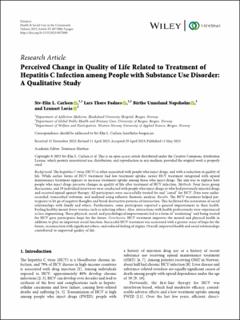| dc.contributor.author | Carlsen, Siv-Elin Leirvåg | |
| dc.contributor.author | Fadnes, Lars T. | |
| dc.contributor.author | Napsholm, Birthe Unneland | |
| dc.contributor.author | Lorås, Lennart | |
| dc.date.accessioned | 2023-12-18T08:56:44Z | |
| dc.date.available | 2023-12-18T08:56:44Z | |
| dc.date.created | 2023-07-11T09:18:00Z | |
| dc.date.issued | 2023 | |
| dc.identifier.citation | Health and Social Care in the Community. 2023, 2023 . | en_US |
| dc.identifier.issn | 0966-0410 | |
| dc.identifier.uri | https://hdl.handle.net/11250/3107951 | |
| dc.description.abstract | Background. The hepatitis C virus (HCV) is often associated with people who inject drugs, and with a reduction in quality of life. While earlier forms of HCV treatment had low treatment uptake, newer HCV treatment integrated with opioid maintenance treatment appears to increase treatment uptake among those who inject drugs. The aim was to explore how people who inject drugs perceive changes in quality of life after treatment of HCV infection. Methods. Four focus group discussions, and 19 individual interviews were conducted with people who inject drugs or who had previously injected drugs and received opioid agonist therapy. All participants were successfully treated for and “cured” for HCV. Data were audio-recorded, transcribed verbatim, and analyzed using reflexive thematic analysis. Results. The HCV treatment helped participants to let go of negative thoughts and break destructive patterns of interaction. This facilitated the restoration of social relationships with family and others. Furthermore, some participants reported a general improvement in their health. Feeling healthy meant fewer worries such as infecting others. Also, interactions with health professionals were experienced as less stigmatizing. These physical, social, and psychological improvements led to a form of “awakening” and being treated for HCV gave participants hope for the future. Conclusion. HCV treatment improves the mental and physical health in addition to play an important social function. Successful HCV treatment was associated with a greater sense of hope for the future, reconnection with significant others, and reduced feeling of stigma. Overall, improved health and social relationships contributed to improved quality of life. | en_US |
| dc.language.iso | eng | en_US |
| dc.publisher | Wiley/Hindawi | en_US |
| dc.rights | Navngivelse 4.0 Internasjonal | * |
| dc.rights.uri | http://creativecommons.org/licenses/by/4.0/deed.no | * |
| dc.title | Perceived Change in Quality of Life Related to Treatment of Hepatitis C Infection among People with Substance Use Disorder: A Qualitative Study | en_US |
| dc.type | Peer reviewed | en_US |
| dc.type | Journal article | en_US |
| dc.description.version | publishedVersion | en_US |
| dc.rights.holder | Copyright © 2023 Siv-Elin L. Carlsen et al. | en_US |
| dc.source.pagenumber | 9 | en_US |
| dc.source.volume | 2023 | en_US |
| dc.source.journal | Health and Social Care in the Community | en_US |
| dc.identifier.doi | 10.1155/2023/4073080 | |
| dc.identifier.cristin | 2161822 | |
| dc.source.articlenumber | 4073080 | en_US |
| cristin.ispublished | true | |
| cristin.fulltext | original | |
| cristin.qualitycode | 1 | |

